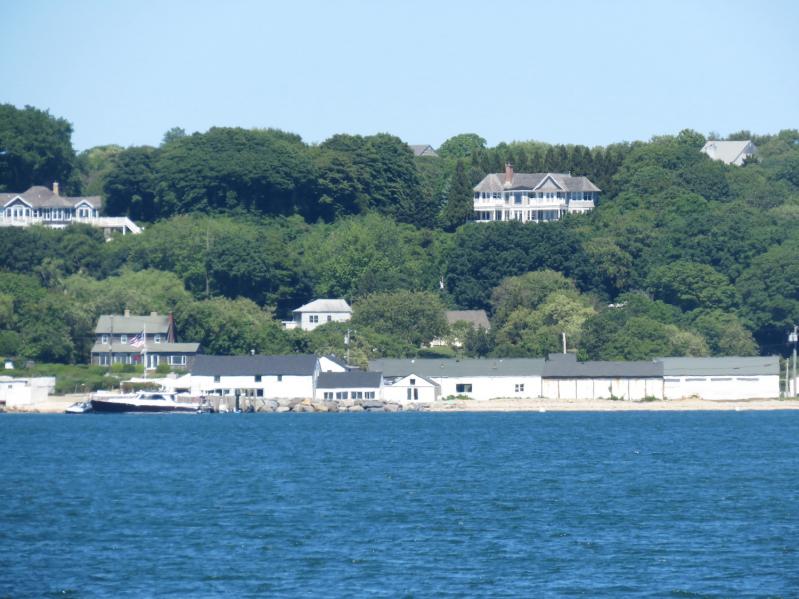East Hampton Town has asked a New York State Supreme Court judge to hold the owner of Duryea’s, on Fort Pond Bay in Montauk, in contempt of the court’s May 2019 orders allowing a certificate of occupancy to remain in effect, order the removal of a new parking lot and deck that were constructed without proper permits, and allow the town to resume enforcement of its ordinances.
In an affirmation submitted to Justice David T. Reilly on Monday, Steven Stern, outside counsel for the town, issued a litany of complaints about the business, which has been in a legal battle with the town since shortly after the Montauk institution was bought by the billionaire investor Marc Rowan in 2014.
In his May 2019 ruling, Justice Reilly allowed a certificate of occupancy that had been issued in February of that year, but which the town’s zoning board of appeals was considering rescinding, to remain in effect. (The certificate of occupancy was later revoked, but Justice Reilly’s previous order directed that it remain in effect pending further order.) He also ruled, however, that Mr. Rowan’s corporation, Sunrise Tuthill, “shall continue the operations on the subject property in the same manner as it has operated in the last two years and shall make a good faith effort to work with the community to effectuate a positive environment for all concerned.”
A 1997 zoning board decision had held that a restaurant on the site was not a pre-existing use, and that there had never been table service, but rather that the only pre-existing nonconforming use on the property was a fish market. Duryea’s, Mr. Stern charged in a motion to vacate a 2019 stay order, has ignored this and flouted subsequent rulings by altering the property and its use without required permits from the town.
Mr. Rowan had sued the town three times in 2018: once to have the court compel the town to issue a certificate of occupancy to legalize existing uses and structures, a second time to assert that the town has no jurisdiction over the property’s dock, underwater lands, and shoreline fortification structures, and, third, to change the zoning for a portion of the property from residential to waterfront business.
A settlement with the town was announced early in 2019. But the settlement was signed by Michael Sendlenski, who was then the town attorney, and not then-Supervisor Peter Van Scoyoc, and the town board did not vote on a resolution authorizing the settlement before it was finalized. Following public criticism, the town board hired outside counsel to advise it on litigation involving Duryea’s, and that counsel said the settlement was invalid and should be vacated. Justice Reilly issued a temporary restraining order suspending implementation of the settlement, but took no action with respect to the certificate of occupancy.
Mr. Rowan subsequently filed two additional lawsuits, one seeking to compel the Building Department to issue a building permit for the installation of an alternative/innovative septic system, the other to prohibit the zoning board from rescinding the certificate of occupancy.
Today, Mr. Stern wrote, Duryea’s “has enjoyed all the benefits of the stay order now for six summer seasons, with its seventh season underway, while the town was restricted from enforcing its code” with respect to Duryea’s operation, which, by expanding the facility, continues in contravention of its code.
Duryea’s, Mr. Stern charges, constructed a new deck and added new parking spaces to a residential structure, when the court had only granted its application to install the new commercial septic system. This, he said, is “at least the fifth time” the stay order was “brazenly violated.”
The town initially moved, in September 2023, for the court to vacate the 2019 orders and hold Sunrise Tuthill in contempt. The motion was premised on what it said was unauthorized use of the indoor portion of the property as an event space, which Duryea’s itself had exposed by posting pictures depicting it on its Instagram account. “We can’t control the rain,” was the message accompanying the Aug. 28, 2023, post, “but we can control the experience. Snapshots from a lovely celebration indoors this past weekend.”
“In doing so,” Mr. Stern wrote, Duryea’s “had illegally converted its limited outdoor food service establishment into a full-blown restaurant and event space” in violation of the court’s stay order and far exceeding the scope of the certificate of occupancy or “anything contemplated by the settlement agreement at issue.”
The town’s fire marshals had also observed construction of a new exterior wood-frame structure in 2021 and advised Duryea’s counsel that it would be brought to the court’s attention. Duryea’s removed the structure. Two years later, the town learned that Duryea’s had increased its outdoor seating footprint, Mr. Stern wrote, by opening a new dining area in a previously vegetated section of the property, clearing and grading in a wetlands area without a natural resources special permit. Duryea’s, he wrote, tried to justify its action using a long-expired Covid-19 permit issued under an emergency order temporarily allowing such expansion to comply with social-distancing requirements.
Most recently, Mr. Stern noted, the court granted Sunrise Tuthill’s request for a temporary restraining order preventing the town from interfering with its installation of the new septic system, but the installation was apparently flawed: “Duryea’s operated during Memorial Day weekend while flooding the street with sewage,” he wrote, attaching a May 26 police report detailing sewage overflow into the roadway. Duryea’s “apparently used that construction as an opportunity to make further, significant changes on the property unrelated to the installation of the septic system,” he said, pointing to the parking spaces on the residential property and the wraparound wooden deck at the entrance to its retail store, all constructed without required permits, he said.
“There can be no question that [Duryea’s] violated a lawful mandate of this court,” Mr. Stern wrote. “The stay order required that that petitioner maintain the same operations as existed during the 2018 and 2019 seasons.” The most recent instances of violation of the court’s stay order “impairs, impedes, and prejudices the town’s ability to enforce its code, which protects the environment, the health, safety, and aesthetics” of the town at large, he wrote. “This property is situated in a sensitive wetlands area, which makes regulatory enforcement particularly important.”
An attorney representing Sunrise Tuthill did not reply to requests for comment.




